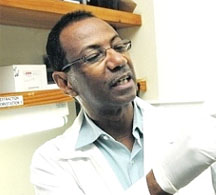(Jamaica Observer) In 2007, two years after its creation, Caribbean Genetics (CARIGEN) burst into the public spotlight with research suggesting that more than 30 per cent of Jamaican men were not the biological fathers of their children.
The revelation of this “jacket” phenomenon not only caused many less than honest mothers to cringe, but pushed many suspicious cuckold fathers to discreetly seek out the DNA-testing services.
A few years later, the University of the West Indies-run research company used Deoxyribonucleic Acid (DNA) evidence to identify the remains of 11-year-old Ananda Dean, the victim of one of the most horrific child murders in the country’s recent history. With only bones to work with, the CARIGEN team was able to identify that the body was that of the little girl whose disappearance, rape and murder in September 2009 rocked the nation.

The facility was the first, and so far, the only private independent commercial laboratory to provide forensic DNA and paternity services to the courts, academia, the medical fraternity and private citizens across the Caribbean.
Paternity testing services using DNA is still the oil in CARIGEN’s business engine in 2011, as demand for these tests continues to be high — roughly 20 to 25 cases per week, at $23,000 a pop. In fact, paternity testing — whether private or court-ordered — generated approximately $21 million in revenue for the company last year alone. It represents 80 per cent of the company’s revenue.
Five to 10 per cent of CARIGEN’s earnings come from contract research — doing actual testing for other departments at the university.
“We build into the project the cost of doing the test. So rather than them sending it to the US to do the test, we do it here,” said director, Professor Wayne McLoughlin.
Forensic services also contribute to the company’s bottom-line with the overflow from the Government forensics lab often ending up in the campus-based facilities. McLoughlin added that the unit’s state-of-the-art set-up, complete with robotic extraction of DNA, has also lured members of the legal fraternity seeking independent, reliable and modern testing of forensic evidence on behalf of their clients.
According to McLoughlin, anyone in Jamaica seeking similar services will likely have to seek it overseas at much greater cost.
However, CARIGEN has no intention of resting on its laurels and is now trying to tap into much more fertile commercial soil.
“The newest area that we most recently moved into is molecular diagnostics,” said McLoughlin.
In May 2009, CARIGEN propelled itself more fully into the world of the genetic testing business, with the expansion of its services to include DNA-based screening for parental genetic disorders including Down’s Syndrome. The new tests were more affordable and faster than before and have the same level of accuracy, which has caused local medical practitioners to take all their business to CARIGEN.
“We also look at sexually transmitted diseases, STIs. Again, it is an area that is in demand, for example, Gonorrhoea, Chlamydia, Trichomonas… it is a public health issue and it is easier to test this way and much quicker,” McLoughlin explained.
He said in the past, with the traditional microbiological method, with Gonorrhoea, for example, you had to wait up to four or five days for test results to diagnose these STIs. With the DNA method, you can get those test results in 24 hours. This is quickly growing into a powerful revenue generator for CARIGEN.
But the facility has launched into an even newer and potentially more lucrative field.
“Infectious diseases diagnostics, this is a new and developing area using DNA technology, and where the business is going. It is expected to grow in worth to $2 billion. It is a big business worldwide,” he explained.
“This means from the area of development of the technologies, meaning the kits that are used (and) you have companies that develop these testing kits, to the users of the kits, to doing the diagnostics, that whole industry is worth billions of dollars, billions,” he said.



